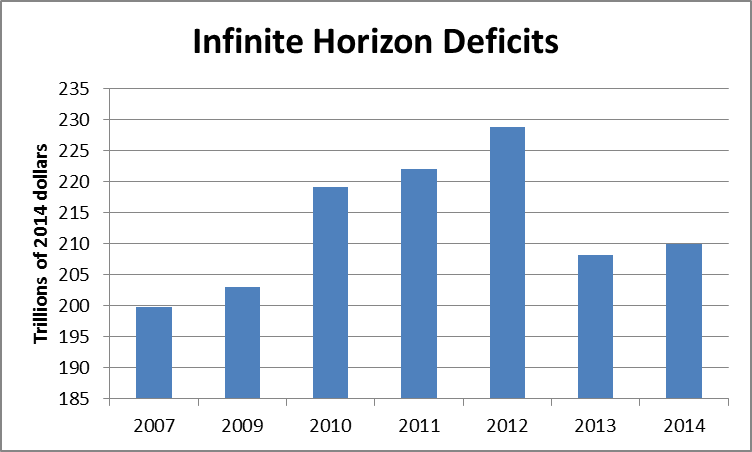May 28, 2015
Given the obsession with the government budget deficit that NPR shares with most major news outlets, you would think they would find some room to mention a drop in the defcit of $20 trillion (yes, that’s “trillion” with a “t”), but no, apparently they didn’t think it was important.
If this sounds very strange to you, it’s because the decline is in a bizarre measure of the deficit known as the “infinite horizon” budget deficit. Its originator was Boston University professor Lawrence Kotlikoff. The idea is to make projections of spending for the infinite future, compare them to projections of revenue, and then calculate the shortfall.
This can lead to some very large figures. For example, when NPR chose to report on the number back in 2011, the figure was $211 trillion (measured in 2011 dollars). I criticized the network at the time because this number was mentioned with absolutely zero context. Not only is there the problem that we are making projections for decades and centuries into the future (hey, will 2108 be a good year?), there is also the problem that almost no one hearing this number would have any idea what it means.
NPR has a well-educated listenership, but I would be quite certain that less than one in a thousand of their listeners would be able to tell much difference if the number was cut in half or doubled. $211 trillion is a really big number, but so is $106 trillion or $422 trillion. If the point is to convey information rather than just scare people then the number could at least have been expressed as share of future income. (It would have been just under 13 percent.)
It also would have been helpful to note that the main factor driving this large deficit was a projected explosion in health care costs. Under the assumptions used in the deficit calculations, the average health care costs for an 85-year old would be over $45,000 a year in 2030 and over $110,000 a year in 2080 (both numbers are in 2015 dollars). If these numbers prove accurate, we would face an enormous problem regardless of what we did with Medicare and Medicaid. Almost no seniors would be able to afford health care (nor would most other people). By just reporting the deficit numbers, NPR was implying that the problem was one of public spending as opposed to a broken health care system. (No other wealthy country is projected to experience a similar explosion of health care costs, which suggests the obvious solution of having people use more efficient health care systems elsewhere, but public debate is controlled by ardent protectionists.)
But there is a further point worth making about whether NPR’s intentions were to scare or inform their listeners. By Kotlikoff’s own calculations the deficit fell by more than $20 trillion between 2012 and 2013, a decline of just under 9 percent.

Source: Kotlikoff, 2015. Numbers adjusted for inflation using CPI-U.
If it was important for the public to know that the deficit by Kotlikoff’s measure was over $200 trillion back in 2011, presumably it would also have been important for the public to know that Kotlikoff’s infinite horizon deficit had fallen by $20 trillion two years later. Why no coverage?







Comments